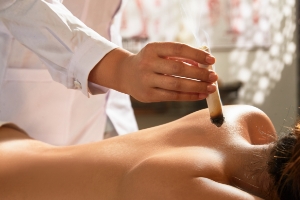No products in the cart.
Kidney Tonic (Yin)
CLINICAL APPLICATIONS
- Kidney yin deficiency with depletion of the marrow and jing (essence)
- Clinical signs and symptoms: dizziness, vertigo, weakness of knees, soreness of the lower back, night and spontaneous sweating, spermatorrhea and nocturnal emission, tinnitus, dribbling of urine, thirst with desire to drink, dry mouth and throat, mirror-like tongue surface with little coating
- Clinical applications: male sexual dysfunction (spermatorrhea and nocturnal emission), infertility due to premature ovarian failure, uterine bleeding, amenorrhea, multiple neuritis, and polyneuritis
WESTERN THERAPEUTIC ACTIONS
- Antiaging function to stop premature aging
- Treats sexual and reproductive disorders
- Improves sensory and nerve functions
- Adaptogenic effect of alleviating mental and physical stress
INGREDIENTS
- Fu Ling (Poria)
- Gan Cao (Radix et Rhizoma Glycyrrhizae)
- Gou Qi Zi (Fructus Lycii)
- Gui Ban Jiao (Gelatinum Plastrum Testudinis)
- Huang Jing (Rhizoma Polygonati)
- Lu Jiao Shuang (Cornu Cervi Degelatinatum)
- Niu Xi (Radix Achyranthis Bidentatae)
- Nu Zhen Zi (Fructus Ligustri Lucidi)
- Shan Yao (Rhizoma Dioscoreae)
- Shan Zhu Yu (Fructus Corni)
- Shu Di Huang (Radix Rehmanniae Praeparata)
- Tu Si Zi (Semen Cuscutae)
FORMULA EXPLANATION
Kidney Tonic (Yin) is designed to tonify the Kidney yin and replenish the marrow and jing (essence). Since the brain is a sea of marrow, deficiency of the marrow may lead to dizziness and vertigo. Kidney deficiency often causes lower body weakness, leading to weak knees and sore back. Night sweating, dry mouth, throat, and thirst indicate general yin deficiency and lack of body fluids. Nocturnal emission and spermatorrhea result from deficiency fire, causing the jing (essence) to leak. A mirror-like tongue surface with little coating indicates severe yin deficiency.
Kidney Tonic (Yin) uses Shu Di Huang (Radix Rehmanniae Praeparata) to tonify and replenish the Kidney yin. Gou Qi Zi (Fructus Lycii) tonifies jing (essence) and improves vision to relieve dizziness. Shan Zhu Yu (Fructus Corni) has a sour taste and astringes the yin and body fluids to prevent further depletion. Gui Ban Jiao (Gelatinum Plastrum Testudinis) and Lu Jiao Shuang (Cornu Cervi Degelatinatum) are two animal substances that have a powerful effect on nourishing the Kidney and tonify the jing (essence). Tu Si Zi (Semen Cuscutae) combines with Niu Xi (Radix Achyranthis Bidentatae) to tonify the Kidney and strengthen the lower body to relieve sore back and weak knees. Shan Yao (Rhizoma Dioscoreae) tonifies the Kidney and strengthens the Spleen. Nu Zhen Zi (Fructus Ligustri Lucidi) and Huang Jing (Rhizoma Polygonati) further replenish Kidney yin while Fu Ling (Poria) strengthens the Spleen to help with the absorption of the tonics. Finally, Gan Cao (Radix et Rhizoma Glycyrrhizae) harmonizes the entire formula.
In conclusion, Kidney Tonic (Yin) tonifies Kidney Yin and treats related biomedical disorders.
Kidney Tonic (Yin) uses Shu Di Huang (Radix Rehmanniae Praeparata) to tonify and replenish the Kidney yin. Gou Qi Zi (Fructus Lycii) tonifies jing (essence) and improves vision to relieve dizziness. Shan Zhu Yu (Fructus Corni) has a sour taste and astringes the yin and body fluids to prevent further depletion. Gui Ban Jiao (Gelatinum Plastrum Testudinis) and Lu Jiao Shuang (Cornu Cervi Degelatinatum) are two animal substances that have a powerful effect on nourishing the Kidney and tonify the jing (essence). Tu Si Zi (Semen Cuscutae) combines with Niu Xi (Radix Achyranthis Bidentatae) to tonify the Kidney and strengthen the lower body to relieve sore back and weak knees. Shan Yao (Rhizoma Dioscoreae) tonifies the Kidney and strengthens the Spleen. Nu Zhen Zi (Fructus Ligustri Lucidi) and Huang Jing (Rhizoma Polygonati) further replenish Kidney yin while Fu Ling (Poria) strengthens the Spleen to help with the absorption of the tonics. Finally, Gan Cao (Radix et Rhizoma Glycyrrhizae) harmonizes the entire formula.
In conclusion, Kidney Tonic (Yin) tonifies Kidney Yin and treats related biomedical disorders.
BACKGROUND
The function of the Kidney in traditional Chinese medicine is closely related to the physiology of the genitourinary system in Western medicine. In Western medicine, genitourinary disorders include various conditions, such as infertility, low libido, sexual dysfunction, increased urinary frequency, polyuria, urinary incontinence, nephrotic syndrome, chronic nephritis, and others. In traditional Chinese medicine, these disorders are usually diagnosed as Kidney yang deficiency, Kidney yin deficiency, or both.






